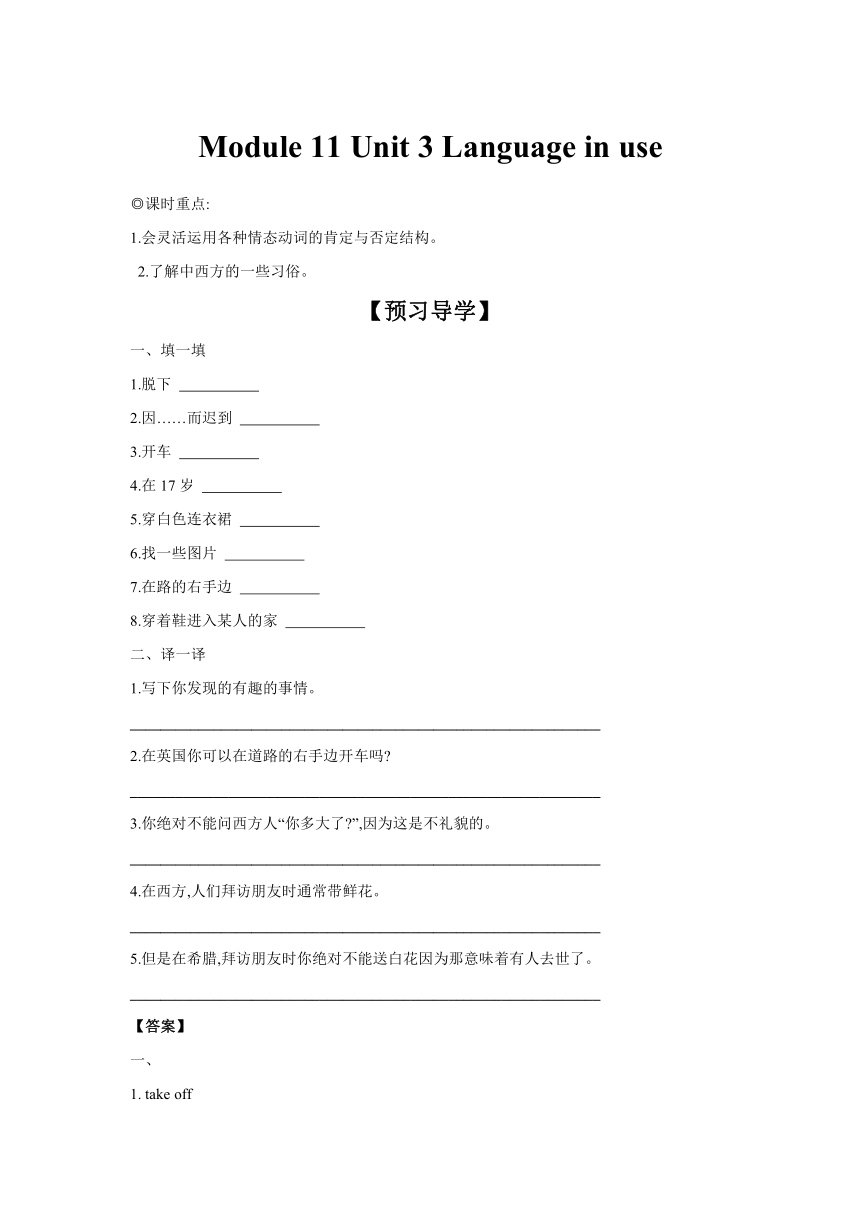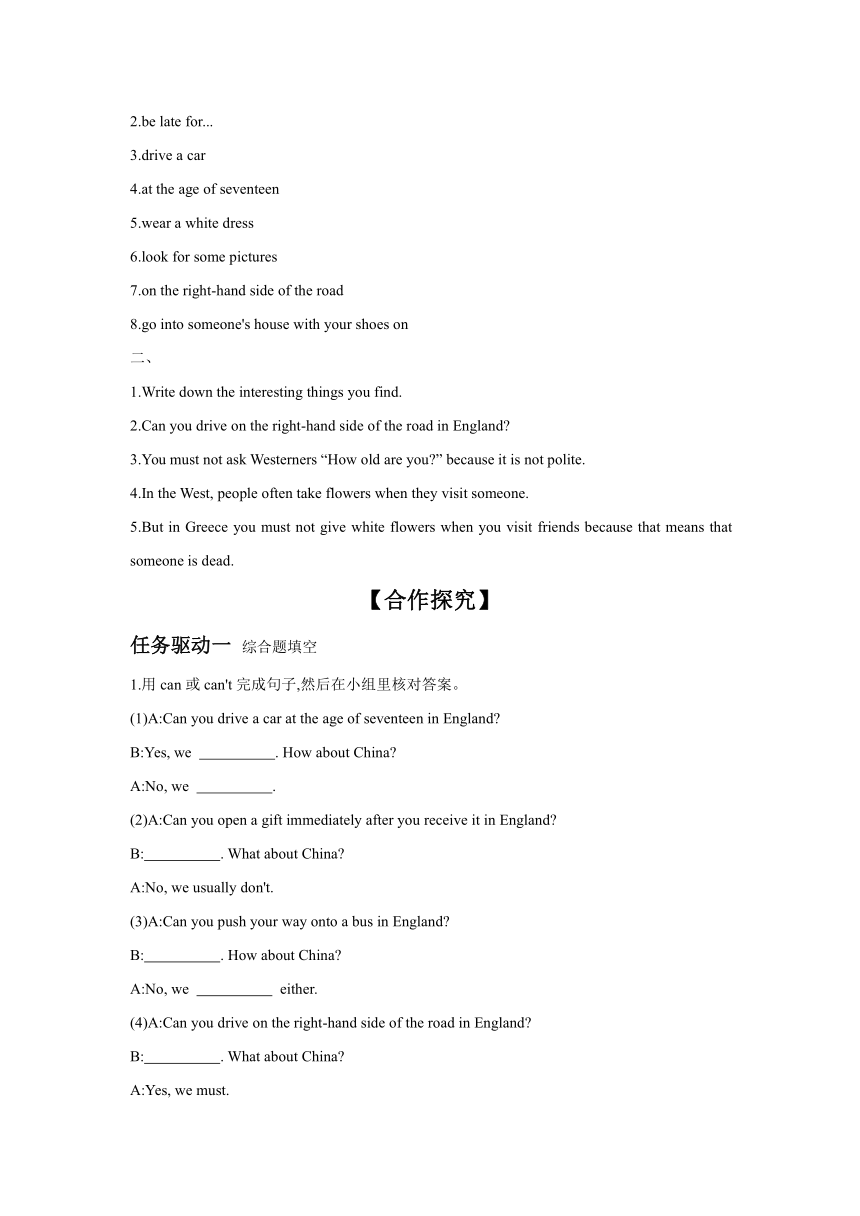Module 11 Unit 3 Language in use 学案初中英语外研版八年级上册(含答案)
文档属性
| 名称 | Module 11 Unit 3 Language in use 学案初中英语外研版八年级上册(含答案) |

|
|
| 格式 | docx | ||
| 文件大小 | 34.3KB | ||
| 资源类型 | 教案 | ||
| 版本资源 | 外研版 | ||
| 科目 | 英语 | ||
| 更新时间 | 2024-02-28 00:00:00 | ||
图片预览



文档简介
Module 11 Unit 3 Language in use
◎课时重点:
1.会灵活运用各种情态动词的肯定与否定结构。
2.了解中西方的一些习俗。
【预习导学】
一、填一填
1.脱下
2.因……而迟到
3.开车
4.在17岁
5.穿白色连衣裙
6.找一些图片
7.在路的右手边
8.穿着鞋进入某人的家
二、译一译
1.写下你发现的有趣的事情。
______________________________________________________________
2.在英国你可以在道路的右手边开车吗
______________________________________________________________
3.你绝对不能问西方人“你多大了 ”,因为这是不礼貌的。
______________________________________________________________
4.在西方,人们拜访朋友时通常带鲜花。
______________________________________________________________
5.但是在希腊,拜访朋友时你绝对不能送白花因为那意味着有人去世了。
______________________________________________________________
【答案】
一、
1. take off
2.be late for...
3.drive a car
4.at the age of seventeen
5.wear a white dress
6.look for some pictures
7.on the right-hand side of the road
8.go into someone's house with your shoes on
二、
1.Write down the interesting things you find.
2.Can you drive on the right-hand side of the road in England
3.You must not ask Westerners “How old are you ” because it is not polite.
4.In the West, people often take flowers when they visit someone.
5.But in Greece you must not give white flowers when you visit friends because that means that someone is dead.
【合作探究】
任务驱动一 综合题填空
1.用can或can't完成句子,然后在小组里核对答案。
(1)A:Can you drive a car at the age of seventeen in England
B:Yes, we . How about China
A:No, we .
(2)A:Can you open a gift immediately after you receive it in England
B: . What about China
A:No, we usually don't.
(3)A:Can you push your way onto a bus in England
B: . How about China
A:No, we either.
(4)A:Can you drive on the right-hand side of the road in England
B: . What about China
A:Yes, we must.
2.用must或must not完成句子。
School rules
(1)You be late for school.
(2)You eat in the library.
(3)You ride your bike in the playground.
(4)You do your homework.
(5)You listen to the teacher.
3.从括号内选择正确的词或词组完成短文。
It's important to know what you must and must not do when you meet people from a different country.
You (1) (may / must not) ask Westerners “How old are you ” because it is not polite. You (2) (might / can) know someone well, but you (3) (must / need) not ask “How much money do you make ” He (4) (may / can) never speak to you again!
In public places, you (5) (must / can) ask people before you take photos of them, and you (6) (must not / might not) eat or drink in shops or museums.
In some countries you (7) (cannot / can) go into someone's house with your shoes on. You (8) (need not / must not) take them off. But in some countries you (9) (might / must not) wear shoes in the house.
4.用方框中所给词或词组的正确形式完成句子。
baseball cap chess set chopsticks
dictionary presents
(1)Use your to look up any words you do not understand.
(2)Most Chinese people eat noodles with .
(3)Jenny could not wait to open her birthday .
(4)He thinks it is cool to wear his back-to-front.
(5)Where is my Let's play a game.
任务驱动二 听力练习
1.听教材上4的录音,听一个少年谈论他的生活。勾出什么是他必须做的,什么是他不能做的。
must mustn't
1.clean up bedroom once a week
2.wash up after dinner
3.stay out after 9 pm
4.do homework before going out
5.wash hands before dinner
6.play music loudly after 10 pm
2.再听一遍录音,写出他能做的两件事。
______________________________________________________________
______________________________________________________________
任务驱动三 小组活动
1.先写一写你在家能做的事、必须做的事和一定不能做的事,然后进行小组讨论。
I can... I must... I must not...
完成任务所需的语言结构:
A:I must visit my grandparents once a week. I mustn't stay up late in the evening.
B:...
2.做游戏
从方框内选一个词或词组,向同学们描述这个词或词组,让同学们猜是什么。
baseball cap bike chess set chocolate
chopsticks dictionary fish and chips
litter photo video game
完成任务所需的语言结构:
A:Many people have one.
B:Is it a chess set
A:No. You use it to get to places.
C:Is it a bike
A:Yes.
【答案】
任务驱动一
1.(1)can; can't
(2)Yes, we can
(3)No, we can't; can't
(4)No, we can't
2.(1)must not (2)must not (3)must not (4)must
(5)must
3.(1)must not (2)might (3)must (4)may
(5)must (6)must not (7)can (8)need not
(9)must not
4.(1)dictionary (2)chopsticks (3)presents
(4)baseball cap (5)chess set
【知识超市】
●情态动词
情态动词表示说话人对动作的态度,如需要、可能、意愿或怀疑等。情态动词本身有一定的意义,但不完全,不能单独作谓语,必须与不带to的动词不定式(即动词原形)连用。情态动词没有人称和数的变化。情态动词有can, could, may, might, must, should, would,等。
构成:情态动词和动词原形一起构成句子的谓语。
1.can
(1)can表示能力,有时可以和be able to转换。例如:
Can you swim 你会游泳吗
(2)表示同意、允许。例如:
Can I borrow your ruler, please 请问我可以用你的尺子吗
(3)can't用在否定句中,表示十分有把握的否定推测,意为“不可能”。例如:
It can't be John. He has gone to New York. 那个人不可能是约翰,他去纽约了。
2.could
(1)could作can的过去式,表示过去的能力或可能性。例如:
She couldn't drive a car when she was sixteen years old. 她16岁的时候,还不会开车。
(2)could用于委婉、客气地提出问题或陈述看法,属一般式,回答时用其原形回答。例如:
—Could I borrow your pen
——我可以用你的钢笔吗
—Yes, you can.
——是的,你可以。
3.might
(1)作may的过去式,表示允许或可能性。例如:
I thought you might stay with us.我想你可以和我们待在一起。
(2)表示允许,谈论现在的情况,用来代替may,但语气比may更委婉。例如:
Might I borrow your ruler 我可否借一下你的尺子
(3)表示可能性,意为“可能;也许”,表达的可能性比may小。例如:
Mr Chen might not be here. 陈先生或许不在这儿。
4.would
would是will的过去式,“would+动词原形”构成过去将来时。除此之外,would是单独的情态动词。
(1)表示过去的意志、愿望和决心。例如:
I told him that I would go along with him. 我告诉他我将和他一起去。
(2)委婉提出请求、建议或看法,语气比will委婉,肯定答语用will。例如:
—Would you help him ——你会帮助他吗
—Yes, I will. ——是的,我会。
5.should
should是shall的过去式,但它又是一个单独意义的情态动词。可以用来表示劝告、建议,还可表示预测可能性。例如:
They should come here now. 现在他们应该来这儿了。
做一做:单项选择。
( )1.You stop when the traffic lights turn red.
A.can
B.had better
C.need
D.must
( )2. — I swim here
—I'm sorry. Children swim alone here.
A.Must; can't
B.May; must
C.Can; mustn't
D.Can't; can
【答案】
1~2 DC
◎课时重点:
1.会灵活运用各种情态动词的肯定与否定结构。
2.了解中西方的一些习俗。
【预习导学】
一、填一填
1.脱下
2.因……而迟到
3.开车
4.在17岁
5.穿白色连衣裙
6.找一些图片
7.在路的右手边
8.穿着鞋进入某人的家
二、译一译
1.写下你发现的有趣的事情。
______________________________________________________________
2.在英国你可以在道路的右手边开车吗
______________________________________________________________
3.你绝对不能问西方人“你多大了 ”,因为这是不礼貌的。
______________________________________________________________
4.在西方,人们拜访朋友时通常带鲜花。
______________________________________________________________
5.但是在希腊,拜访朋友时你绝对不能送白花因为那意味着有人去世了。
______________________________________________________________
【答案】
一、
1. take off
2.be late for...
3.drive a car
4.at the age of seventeen
5.wear a white dress
6.look for some pictures
7.on the right-hand side of the road
8.go into someone's house with your shoes on
二、
1.Write down the interesting things you find.
2.Can you drive on the right-hand side of the road in England
3.You must not ask Westerners “How old are you ” because it is not polite.
4.In the West, people often take flowers when they visit someone.
5.But in Greece you must not give white flowers when you visit friends because that means that someone is dead.
【合作探究】
任务驱动一 综合题填空
1.用can或can't完成句子,然后在小组里核对答案。
(1)A:Can you drive a car at the age of seventeen in England
B:Yes, we . How about China
A:No, we .
(2)A:Can you open a gift immediately after you receive it in England
B: . What about China
A:No, we usually don't.
(3)A:Can you push your way onto a bus in England
B: . How about China
A:No, we either.
(4)A:Can you drive on the right-hand side of the road in England
B: . What about China
A:Yes, we must.
2.用must或must not完成句子。
School rules
(1)You be late for school.
(2)You eat in the library.
(3)You ride your bike in the playground.
(4)You do your homework.
(5)You listen to the teacher.
3.从括号内选择正确的词或词组完成短文。
It's important to know what you must and must not do when you meet people from a different country.
You (1) (may / must not) ask Westerners “How old are you ” because it is not polite. You (2) (might / can) know someone well, but you (3) (must / need) not ask “How much money do you make ” He (4) (may / can) never speak to you again!
In public places, you (5) (must / can) ask people before you take photos of them, and you (6) (must not / might not) eat or drink in shops or museums.
In some countries you (7) (cannot / can) go into someone's house with your shoes on. You (8) (need not / must not) take them off. But in some countries you (9) (might / must not) wear shoes in the house.
4.用方框中所给词或词组的正确形式完成句子。
baseball cap chess set chopsticks
dictionary presents
(1)Use your to look up any words you do not understand.
(2)Most Chinese people eat noodles with .
(3)Jenny could not wait to open her birthday .
(4)He thinks it is cool to wear his back-to-front.
(5)Where is my Let's play a game.
任务驱动二 听力练习
1.听教材上4的录音,听一个少年谈论他的生活。勾出什么是他必须做的,什么是他不能做的。
must mustn't
1.clean up bedroom once a week
2.wash up after dinner
3.stay out after 9 pm
4.do homework before going out
5.wash hands before dinner
6.play music loudly after 10 pm
2.再听一遍录音,写出他能做的两件事。
______________________________________________________________
______________________________________________________________
任务驱动三 小组活动
1.先写一写你在家能做的事、必须做的事和一定不能做的事,然后进行小组讨论。
I can... I must... I must not...
完成任务所需的语言结构:
A:I must visit my grandparents once a week. I mustn't stay up late in the evening.
B:...
2.做游戏
从方框内选一个词或词组,向同学们描述这个词或词组,让同学们猜是什么。
baseball cap bike chess set chocolate
chopsticks dictionary fish and chips
litter photo video game
完成任务所需的语言结构:
A:Many people have one.
B:Is it a chess set
A:No. You use it to get to places.
C:Is it a bike
A:Yes.
【答案】
任务驱动一
1.(1)can; can't
(2)Yes, we can
(3)No, we can't; can't
(4)No, we can't
2.(1)must not (2)must not (3)must not (4)must
(5)must
3.(1)must not (2)might (3)must (4)may
(5)must (6)must not (7)can (8)need not
(9)must not
4.(1)dictionary (2)chopsticks (3)presents
(4)baseball cap (5)chess set
【知识超市】
●情态动词
情态动词表示说话人对动作的态度,如需要、可能、意愿或怀疑等。情态动词本身有一定的意义,但不完全,不能单独作谓语,必须与不带to的动词不定式(即动词原形)连用。情态动词没有人称和数的变化。情态动词有can, could, may, might, must, should, would,等。
构成:情态动词和动词原形一起构成句子的谓语。
1.can
(1)can表示能力,有时可以和be able to转换。例如:
Can you swim 你会游泳吗
(2)表示同意、允许。例如:
Can I borrow your ruler, please 请问我可以用你的尺子吗
(3)can't用在否定句中,表示十分有把握的否定推测,意为“不可能”。例如:
It can't be John. He has gone to New York. 那个人不可能是约翰,他去纽约了。
2.could
(1)could作can的过去式,表示过去的能力或可能性。例如:
She couldn't drive a car when she was sixteen years old. 她16岁的时候,还不会开车。
(2)could用于委婉、客气地提出问题或陈述看法,属一般式,回答时用其原形回答。例如:
—Could I borrow your pen
——我可以用你的钢笔吗
—Yes, you can.
——是的,你可以。
3.might
(1)作may的过去式,表示允许或可能性。例如:
I thought you might stay with us.我想你可以和我们待在一起。
(2)表示允许,谈论现在的情况,用来代替may,但语气比may更委婉。例如:
Might I borrow your ruler 我可否借一下你的尺子
(3)表示可能性,意为“可能;也许”,表达的可能性比may小。例如:
Mr Chen might not be here. 陈先生或许不在这儿。
4.would
would是will的过去式,“would+动词原形”构成过去将来时。除此之外,would是单独的情态动词。
(1)表示过去的意志、愿望和决心。例如:
I told him that I would go along with him. 我告诉他我将和他一起去。
(2)委婉提出请求、建议或看法,语气比will委婉,肯定答语用will。例如:
—Would you help him ——你会帮助他吗
—Yes, I will. ——是的,我会。
5.should
should是shall的过去式,但它又是一个单独意义的情态动词。可以用来表示劝告、建议,还可表示预测可能性。例如:
They should come here now. 现在他们应该来这儿了。
做一做:单项选择。
( )1.You stop when the traffic lights turn red.
A.can
B.had better
C.need
D.must
( )2. — I swim here
—I'm sorry. Children swim alone here.
A.Must; can't
B.May; must
C.Can; mustn't
D.Can't; can
【答案】
1~2 DC
同课章节目录
- Module 1 How to learn English
- Unit 1 Let's try to speak English as much as possi
- Unit 2 You should smile at her.
- Unit 3 Language in use .
- Module 2 My home town and my country
- Unit 1 It's taller than many other buildings.
- Unit 2 Cambridge is a beautiful city in the east o
- Unit 3 Language in use .
- Module 3 Sports.
- Unit 1 Nothing is more exciting than playing tenni
- Unit 2 This year we training more carefully.
- Unit 3 Language in use .
- Module 4 Planes, ships and trains .
- Unit 1 He lives the farthest from school.
- Unit 2 What is the best way to travel.
- Unit 3 Language in use .
- Module 5 Lao She Teahouse.
- Unit 1 I wanted to see the Beijing Opera.
- Unit 2 It descibes the changes in Chinese society.
- Unit 3 Language in use .
- Module 6 Animals in danger.
- Unit 1 It allows people to get closer to them .
- Unit 2 The WWF is working hard to save them all.
- Unit 3 Language in use .
- Revision module A
- Module 7 A famous story
- Unit 1 Alice was sitting with her sister by the ri
- Unit 2 She was thinking about her cat.
- Unit 3 Language in use .
- Module 8 Accidents
- Unit 1 While the car were changing to red, a car s
- Unit 2 I was trying to pick it up when it bite me
- Unit 3 Language in use .
- Module 9 Population
- Unit 1 The population of China is about 1.37 billi
- Unit 2 Arnwick was a city with 200,000 people.
- Unit 3 Language in use .
- Module 10 The weathe
- Unit 1 It might snow.
- Unit 2 The weather is fine all year round.
- Unit 3 Language in use .
- Module 11 Way of life
- Unit 1 In China ,we open a gift later.
- Unit 2 In England, you usually drink tea with milk
- Unit 3 Language in use .
- Module 12 Help
- Unit 1 What should we do before help arrives?
- Unit 2 Stay away from windows and heavy furniture.
- Unit 3 Language in use .
- Revision module B
